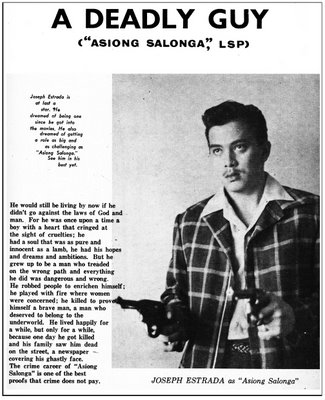I really don't know much about Philippine gangsters but I thought "Manila Kingpin: The Asiong Salonga Story" will be able to provide a more accurate depiction of our country's past criminal underworld. Asiong Salonga was touted as the Filipino Robin Hood raising hell in post World War 2 Tondo Manila, his gang acting as his brave knights and Asiong being hailed as "King of Tondo" is the stuff of legends.
What I can say about the movie was it tried to show all of this but it failed miserably and this is an understatement, the scenes were disjointed to the point where the audience is left wondering what was going on. Some scenes were incomplete that it made transitions to next scenes difficult to understand and would oftentimes be just confusing. The beginning of the film where Asiong was being tortured was enough of an explanation to know who he is, the problem for the rest of the movie was the narrative.
It failed to show what was Asiong's real purpose in Tondo, yes poverty was eminent in those days but the Robin Hood gimmick was played to death. Asiong was shown as a tough guy with a heart but where was he getting the money? Protection rackets and smuggling alone can't buy you cars and make you look like a millionaire while in jail in postwar Phillipines.
Other actors who were miscast was Asiong's wife Fidela played by Carla Abellana, I cringed over their love scenes because of the age difference and an older actress should have been cast at least to complement the leading man's age. Dennis Padilla who played one of Asiong's "bataan" was also miscast, I couldn't help but laugh at his scenes, I don't know why they would cast a known comedian in a serious film. My praises go first to Baron Geisler, playing the man who betrayed Asiong suited his image and acting style, I believe being typecast as a villain will work wonders for the rest of his career. Jay Manalo playing the "Mayor" who looked after Asiong while in jail was crucial, he was able to portray his role effectively without being eclipsed by ER in every scene they shared.
Last but not the least thank God for Phillip Salvador, I know that he's not as big as he once was in the 90's but he was strong enough to carry the film until the end without ER's presence. Phillip Salvador stood out in the final shootout and that for me saved the film from being completely mediocre. I know some people will argue that the film had it's good merits ( I thought the political subplot NP vs. LP was pretty interesting but it wasn't expanded) and I believe the cinematography and the film's set pieces played a key role in it, the black and white backdrop though was interrupted by certain scenes suddenly showing color, I don't know if that was intentional but I understood it's purpose. The score and music was mediocre as well and I thought it would have been more appropriate for music in the 40's-50's to be played instead I heard rap metal beats in the shadowboxing scene and an 80's song in the shootout, although Ely Buendia's "La Paloma" was quite good some of the score used was more of a distraction that disrupts the timeline that the film was trying to portray. My friends laughed when they heard "Mad World" being played while Dennis Padilla was getting shot, there were a lot of unintentionally funny moments one most notable was Ketchup Eusebio appearing all of a sudden riding a bike in the final shootout which really ruined it for me and for the rest of the audience who just laughed their asses off.
I can point out numerous faults in the film but to be fair to the entire crew and cast I'm sure tried their best to make the film a masterpiece, yes it looked like one in the trailer but it's not a very good film. I was hoping that this will be the movie that will breath life to Philippine Cinema which have been languishing in mediocrity since the late 90's, alas it's not meant to be and for cinephiles like myself we'll probably wait another decade for a film that will finally bring our brand of cinema to international attention.
Side Note: Release the Director's Cut just to be fair to Tikoy Aguiluz.
Grade: C-



























